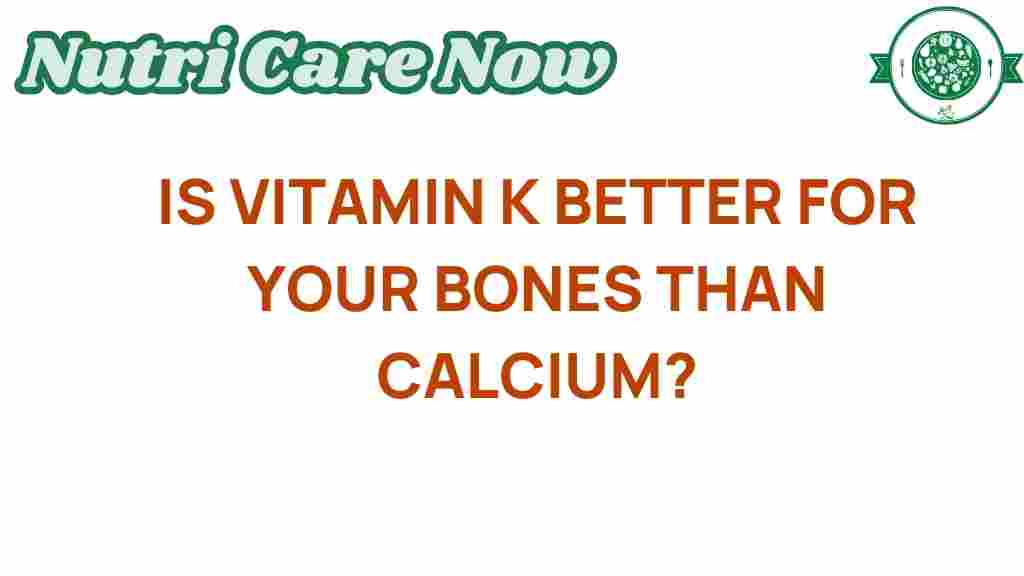Is Vitamin K the Secret Weapon Your Bones Need Over Calcium?
When it comes to maintaining strong and healthy bones, calcium has often been touted as the superstar nutrient. However, recent research suggests that Vitamin K may play an equally important, if not more critical role in bone health. This article will explore the relationship between Vitamin K and calcium, delve into their health benefits, dietary sources, and discuss why Vitamin K might be the secret weapon your bones need.
Understanding Bone Health
Bone health is crucial for overall well-being. Healthy bones support mobility, protect vital organs, and store essential minerals. As we age, bone density decreases, leading to conditions like osteoporosis. While calcium has long been recognized for its importance in bone structure, Vitamin K’s role in bone metabolism is gaining attention.
The Role of Calcium in Bone Health
Calcium is a vital mineral that makes up a significant part of our bones. It aids in:
- Bone formation and maintenance
- Muscle function
- Nerve signaling
- Blood clotting
However, simply consuming calcium-rich foods or supplements may not be sufficient for optimal bone health. The body requires a complex interplay of nutrients to effectively utilize calcium.
Introducing Vitamin K: The Unsung Hero
Vitamin K is a fat-soluble vitamin that plays a crucial role in bone metabolism. It exists in two primary forms: K1 (phylloquinone), found in leafy greens, and K2 (menaquinone), found in fermented foods and animal products. The notable benefits of Vitamin K for bone health include:
- Activating osteocalcin, a protein that binds calcium to the bone matrix
- Supporting bone mineralization
- Reducing the risk of fractures
The Health Benefits of Vitamin K
Aside from its role in bone health, Vitamin K provides several other health benefits:
- Promotes cardiovascular health by preventing arterial calcification
- Supports healthy brain function
- Enhances insulin sensitivity
- May reduce the risk of certain cancers
Vitamin K and Calcium: A Dynamic Duo
Vitamin K and calcium work synergistically to improve bone health. While calcium is essential for bone structure, Vitamin K ensures that calcium is properly utilized. Without adequate Vitamin K, calcium may not be effectively incorporated into the bones, potentially leading to weaker bones and increased fracture risk.
Dietary Sources of Vitamin K
Incorporating Vitamin K into your diet is crucial for maintaining optimal bone health. Here are some excellent dietary sources of Vitamin K:
Vitamin K1 Sources
- Leafy green vegetables (kale, spinach, collard greens)
- Broccoli
- Brussels sprouts
- Green peas
Vitamin K2 Sources
- Fermented foods (natto, sauerkraut)
- Animal products (meat, cheese, egg yolks)
Incorporating a variety of these foods into your meals can help boost your Vitamin K intake significantly.
Supplements: Do You Need Them?
While it’s always best to obtain nutrients from food, some individuals may benefit from Vitamin K supplements, especially those with dietary restrictions or certain health conditions. Here are some considerations:
- Consult a healthcare provider before starting any supplement regimen.
- Look for high-quality supplements that contain both K1 and K2.
- Monitor your calcium intake to ensure balanced nutrition.
Combining Calcium and Vitamin K for Optimal Bone Health
For those looking to enhance their bone health, a combination of both calcium and Vitamin K is essential. Here’s how to effectively combine these two nutrients:
- Balanced Diet: Focus on a diet rich in both calcium and Vitamin K.
- Targeted Supplements: If necessary, choose high-quality supplements that provide both nutrients.
- Regular Check-ups: Consult with a healthcare provider to monitor bone health and nutrient levels.
Common Myths About Calcium and Vitamin K
As with any health topic, misconceptions abound. Here are a few myths debunked:
- Myth: Calcium alone is enough for bone health.
Fact: Vitamin K is essential for calcium’s role in bones. - Myth: Only supplements can provide adequate Vitamin K.
Fact: Many foods are rich in Vitamin K.
Potential Troubleshooting Tips
If you’re concerned about your bone health or nutrient intake, consider the following troubleshooting tips:
- Evaluate Your Diet: Keep a food diary to ensure you’re consuming enough Vitamin K and calcium.
- Consult a Professional: Speak with a nutritionist or healthcare provider for personalized advice.
- Adjust Your Supplements: If taking supplements, ensure they are balanced and of high quality.
Signs of Vitamin K Deficiency
Vitamin K deficiency can lead to various health issues, including:
- Increased bleeding and bruising
- Weak bones and higher fracture risk
- Bone pain
If you suspect a deficiency, reach out to a healthcare professional for testing and guidance.
Conclusion
In conclusion, while calcium is undoubtedly important for bone health, Vitamin K may be the secret weapon your bones need to thrive. By ensuring you consume adequate amounts of both nutrients through a balanced diet and, if necessary, supplements, you can significantly enhance your bone health and overall well-being. Don’t underestimate the power of nutrition; a well-rounded approach to vitamins is essential for optimal health.
For more information on vitamins and bone health, check out this comprehensive guide. Remember, your bones deserve the best care, so consider integrating Vitamin K into your daily nutritional routine.
For personalized nutrition advice, consider consulting a registered dietitian or nutritionist who can help you tailor your diet to meet your health needs.
This article is in the category Supplements and created by NutriCareNow Team
